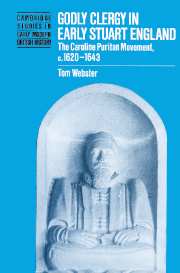Book contents
- Frontmatter
- Contents
- Acknowledgments
- List of abbreviations
- Introduction
- Part I Society, clerical conference and the Church of England
- Part II The godly ministry: piety and practice
- Part III ‘These uncomfortable times’: conformity and the godly ministers 1628–1638
- Part IV ‘These Dangerous Times’: the Puritan Diaspora 1631–1643
- Index
- Cambridge Studies in Early Modern History
Part I - Society, clerical conference and the Church of England
Published online by Cambridge University Press: 04 November 2009
- Frontmatter
- Contents
- Acknowledgments
- List of abbreviations
- Introduction
- Part I Society, clerical conference and the Church of England
- Part II The godly ministry: piety and practice
- Part III ‘These uncomfortable times’: conformity and the godly ministers 1628–1638
- Part IV ‘These Dangerous Times’: the Puritan Diaspora 1631–1643
- Index
- Cambridge Studies in Early Modern History
Summary
From 28 to 30 December 1625, a fast was held at Hatfield Broad Oak in Essex, the home of the Barrington family. Sermons were delivered to the gathering of ministers and laity by John Preston, the master of Emmanuel College, Cambridge, and by James Ussher, recently promoted to the archbishopric of Armagh. It may be dangerous to speculate about the issues raised and discussed at this fast, but the timing is suggestive. As James Harrison, the Barrington chaplain, observed six months later, a fast is called ‘when great things are undertaken …, when any judgement is imminent …, when the church is in danger and when affliction is upon the church’. Preston preached on the first day on 1 Sam. 12.20.
And Samuel said unto the people, Fear not: ye have done all this wickedness: yet turn not from following the lord, but serve the lord with all your heart.
Preston stressed that this exhortation applied to his audience, whom God had chosen for His people, and stressed the dangers of the time, calling for renewed zeal in serving the Lord. On the following day, Ussher reminded them that ‘it is the goodnesse of God though he hath his remnant here, yet he can have more close; wherefore it stands us in hand to labour to keep in God’. He called upon his audience to ‘desire God to give uss peace, to build upp the walls’. While renewal of zeal and watchfulness are common themes of godly preaching, it is difficult to believe that those present at the fast did not discuss the forthcoming York House Conference.
- Type
- Chapter
- Information
- Godly Clergy in Early Stuart EnglandThe Caroline Puritan Movement, c.1620–1643, pp. 9 - 14Publisher: Cambridge University PressPrint publication year: 1997
- 1
- Cited by



